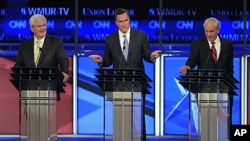In U.S. presidential politics the consensus among experts is that the domestic economy will be the central issue in next year’s campaign. But the recent debate among Republican presidential contenders also focused on foreign policy, especially the future of the U.S. troop commitment in Afghanistan.
The recent Republican debate had a different tone in the discussion of the war in Afghanistan compared to debates in the past two U.S. presidential elections.
Former Massachusetts governor Mitt Romney is the frontrunner for the Republican Party’s presidential nomination next year. Romney says the long U.S. commitment to the war in Afghanistan should serve as a cautionary lesson to those who would support nation-building efforts in the future.
“I want those troops to come home based upon not politics, not based upon economics, but instead based upon the conditions on the ground determined by the generals," he said. "But I also think we have learned that our troops should not go off and try to fight a war of independence for another nation. Only the Afghanis can win Afghanistan’s independence from the Taliban.”
In the past two presidential elections, the Republican candidates, John McCain in 2008 and President George W. Bush in 2004, emphasized the need for the U.S. to prevail over the Taliban in Afghanistan no matter how long it took.
But several of the Republican contenders running this year seem to reflect public opinion polls that show Republicans and Democrats alike growing weary of the nearly 10-year-old U.S.-led war in Afghanistan.
Only one Republican contender, Texas Congressman Ron Paul, advocates for the immediate withdrawal of all U.S. forces from Afghanistan.
“I wouldn’t wait for my generals. I’m the commander in chief. I make the decisions," he said. "I tell the generals what to do and I would bring them home as quickly as possible and I would get them out of Iraq as well. And I wouldn’t start a war in Libya and I would quit bombing Yemen and I’d quit bombing Pakistan.”
The U.S. involvement with the NATO mission in Libya proved to be unpopular with several of the Republicans who took part in the recent debate, including Congresswoman Michele Bachmann of Minnesota.
“Our policy in Libya is substantially flawed," she said. "And all we have to know is that the president deferred leadership in Libya to France. That is all we need to know. The president was not leading when it came to Libya.”
Most of the Republican contenders focus on economic issues since jobs and the tepid economic recovery remain the main concerns of U.S. voters.
But some of the Republican White House contenders have made foreign policy a centerpiece of their campaign, including the former U.S. House speaker, Newt Gingrich.
“Ten years after 9-11 our intelligence is so inadequate that we have no idea what percent of the Libyan rebels is in fact al-Qaida,” he said.
Some Republicans are unhappy with the tone of the Republican presidential debate on the future of the U.S. commitment in Afghanistan.
Among them is South Carolina Senator Lindsey Graham, who along with Senator John McCain is in a group of Republicans who insist that the U.S. and its allies must prevail in Afghanistan without regard to a timetable for troop withdrawals.
“I was disappointed that no one articulated why it matters if we win or lose in Afghanistan," he said. "So I haven’t heard one Republican running for president articulating the strategic importance of winning or losing in Afghanistan.”
Political analysts say the shift in emphasis in the Republican presidential debate on Afghanistan simply reflects the larger public weariness with the war there.
“On Afghanistan, obviously there is growing dissatisfaction with the progress and I’m talking even among Republicans who have been supportive generally," said analyst Stuart Rothenberg, who appeared on VOA’s ‘Encounter’ program. "The bottom line, though, is once again it is all about results. What is going to happen on the ground between now and the next election in Afghanistan, in Iraq?”
Another Republican contender with foreign policy experience will join the presidential race next week. Former Utah governor Jon Huntsman will make his official announcement on Tuesday. Until recently Huntsman served as President Obama’s ambassador to China and says he supports what he calls the desire of most Americans to begin phasing out of Afghanistan as quickly as possible.
Afghanistan Emerging as Issue for US Republican Presidential Hopefuls
- By Jim Malone





